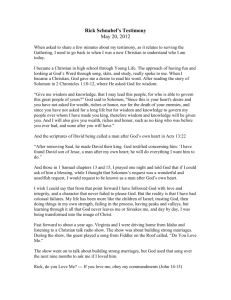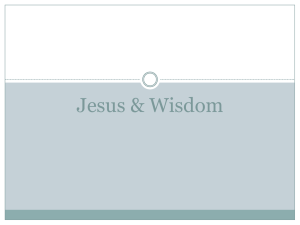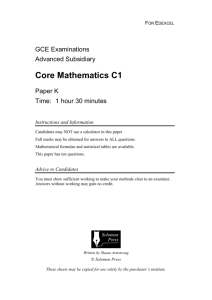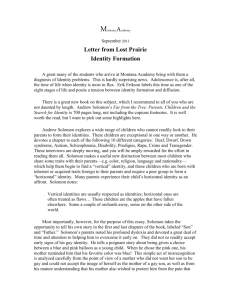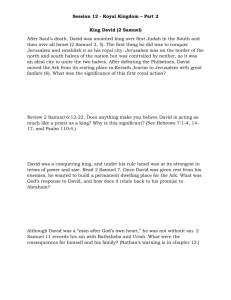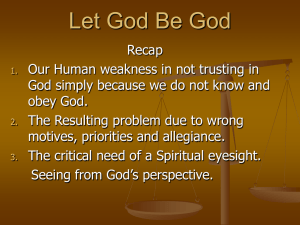discussion guide
advertisement
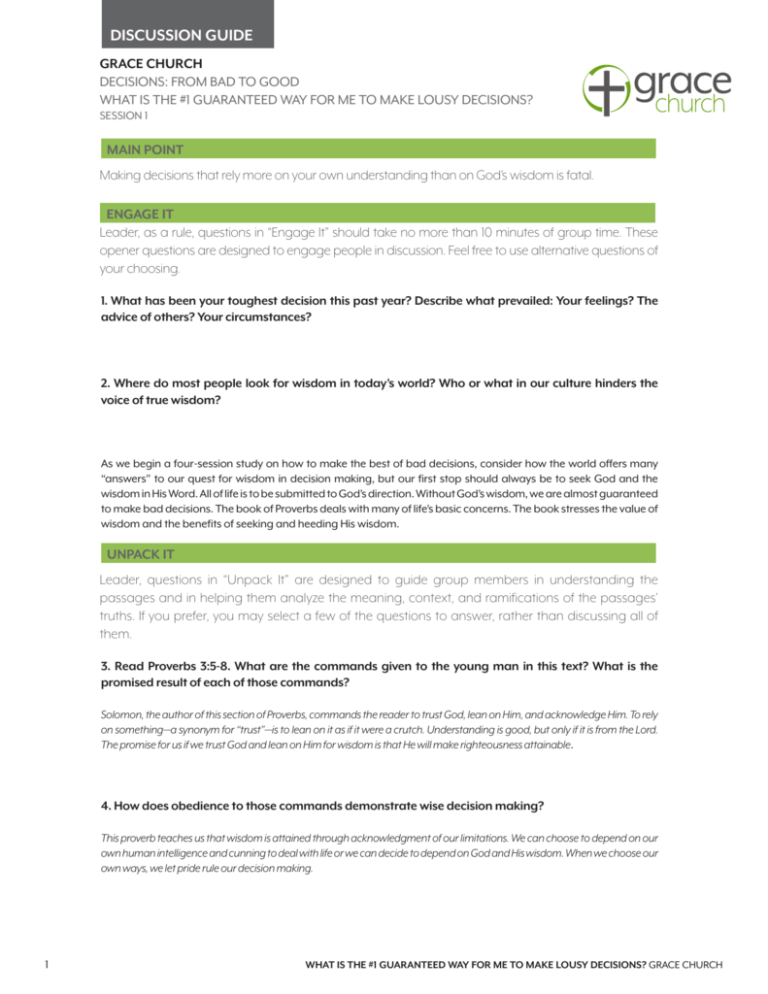
DISCUSSION GUIDE GRACE CHURCH DECISIONS: FROM BAD TO GOOD WHAT IS THE #1 GUARANTEED WAY FOR ME TO MAKE LOUSY DECISIONS? SESSION 1 MAIN POINT Making decisions that rely more on your own understanding than on God’s wisdom is fatal. ENGAGE IT Leader, as a rule, questions in “Engage It” should take no more than 10 minutes of group time. These opener questions are designed to engage people in discussion. Feel free to use alternative questions of your choosing. 1. What has been your toughest decision this past year? Describe what prevailed: Your feelings? The advice of others? Your circumstances? 2. Where do most people look for wisdom in today’s world? Who or what in our culture hinders the voice of true wisdom? As we begin a four-session study on how to make the best of bad decisions, consider how the world offers many “answers” to our quest for wisdom in decision making, but our first stop should always be to seek God and the wisdom in His Word. All of life is to be submitted to God’s direction. Without God’s wisdom, we are almost guaranteed to make bad decisions. The book of Proverbs deals with many of life’s basic concerns. The book stresses the value of wisdom and the benefits of seeking and heeding His wisdom. UNPACK IT Leader, questions in “Unpack It” are designed to guide group members in understanding the passages and in helping them analyze the meaning, context, and ramifications of the passages’ truths. If you prefer, you may select a few of the questions to answer, rather than discussing all of them. 3. Read Proverbs 3:5-8. What are the commands given to the young man in this text? What is the promised result of each of those commands? Solomon, the author of this section of Proverbs, commands the reader to trust God, lean on Him, and acknowledge Him. To rely on something—a synonym for “trust”—is to lean on it as if it were a crutch. Understanding is good, but only if it is from the Lord. The promise for us if we trust God and lean on Him for wisdom is that He will make righteousness attainable. 4. How does obedience to those commands demonstrate wise decision making? This proverb teaches us that wisdom is attained through acknowledgment of our limitations. We can choose to depend on our own human intelligence and cunning to deal with life or we can decide to depend on God and His wisdom. When we choose our own ways, we let pride rule our decision making. 1 WHAT IS THE #1 GUARANTEED WAY FOR ME TO MAKE LOUSY DECISIONS? GRACE CHURCH DISCUSSION GUIDE Proverbs 3:5-8 provides a summary of the benefits we receive from heeding God’s wisdom, instead of our own. Such benefits are spiritual, moral, relational, and physical. Life will not be pain-free for those who rely on the Lord, but we can deal with life’s difficulties because we know He is with us and guiding us in our journey. 5. From Proverbs 3:5-8 and from your own experience, what does it look like to “trust in the LORD with all your heart”? Why is this often challenging for us to do? Trust God. That sounds simple, right? In everything you do, trust God, and He will guide you. But something that sounds so simple may, at times, seem impossible. No matter how hard we try, we can never trust God perfectly. Because we tend to focus on ourselves and our needs and wants, we often struggle to trust God’s care for us. In Proverbs 3:5-8, the writer gives a few specific ways to trust in God “with all your heart.” These include: 1) acknowledging Him “in all your ways” (verse 6), which is to invite His presence into all daily activities and decisions; 2) fearing Him (verse 7), which is related to your worship and reverent approach to Him; and 3) turning away from evil (verse 7), which encourages you toward repentance. 6. Read Proverbs 3:7-8 again. How do we benefit from acknowledging our limitations before God? In verse 7 it says that if you do not consider yourself wise but instead “fear the LORD, and turn away from evil” then that will be “healing to your flesh and refreshment to your bones.” Body and bones here represent the whole person. Essentially, this verse says that when we trust in God’s wisdom, then God fixes our brokenness. He alone supplies peace and healing—blessings for those who place their trust in God. Each day brings a multitude of choices. To navigate these waters, we have two options: we can rely on our own knowledge and understanding for guidance, or we can acknowledge our limitations and seek God’s wisdom. The two main ways we rely on our own understanding are through 1) prayerlessness, and 2) being ignorant of the Word of God. Let us first consider prayerlessness. 7. Read James 4:1-4. What prayer problems does James highlight? James wrote to first-century Christians, exposing bad practices and teaching them right Christian beliefs and the behavior that should follow. In chapter 4 of his letter, he wrote about how prayerlessness and wrongly motivated prayer practices harmfully affected relationships among Christians. James pointed out that they failed to pray, or prayed for the wrong things, or for the wrong reasons. 8. What consequences did prayerlessness have in the lives of James’s audience? These prayer practices resulted in arguing, fighting, jealousy, and pride within the Christian community. 9. What excuses do people use to justify their lack of a meaningful prayer life? Answers will vary, but a few common excuses include not knowing what to talk to God about; being too busy to set aside extended time for prayer; assuming God knows what will happen anyways, so why bother praying; and not feeling adequate enough to come before God. There is never a good excuse to avoid prayer, because it is one of the most important aspects of a person’s relationship with God. 2 WHAT IS THE #1 GUARANTEED WAY FOR ME TO MAKE LOUSY DECISIONS? GRACE CHURCH DISCUSSION GUIDE 10. What do you do when you do not feel like praying? How is your relationship with God and decision making affected by lack of prayer? Times will come when prayer feels like a challenge for any number of reasons. During those times, however, simply acknowledging to God the way you feel and why you feel that way draws you back to Him. Your prayers do not need to be eloquent. They can be as honest and direct as the tax collector’s prayer in Jesus’ parable from Luke 18: “God, be merciful to me, a sinner!” (Luke 18:13). The further you slip out of the practice of prayer, the more disconnected you feel from God and the harder it becomes to discern His wisdom and guidance in your decision making. J. I. Packer writes, “I believe that prayer is the measure of the man, spiritually, in a way that nothing else is, so that how we pray is as important a question as we can ever face.”1 11. Do you agree or disagree with Packer? If how you pray is an accurate measure of your spiritual health, how would you measure up? Answers will vary. In contrast to James’s audience, Solomon gives us a positive example of the relationship between prayer and wise decision making. At the start of his kingship, Solomon demonstrated humility when he prayed to God for the wisdom to rule well. Solomon knew that without God’s wisdom and discernment, he would not be able to lead the nation effectively or live a life that pleased God. 12. Read 1 Kings 3:7-14. Why do you think Solomon desired wisdom above anything else? What does this reveal about him and his relationship with God? Solomon’s prayer marked a major cultural shift in Hebrew life, a shift to peaceful values involving wisdom and skill rather than military craft. Solomon reflected these new values in asking for a heart that would be obedient (to the covenant) in judging the nation. Solomon’s request was a request to discern. That a ruler of a great empire would desire an obedient, wise heart signaled a major change in values. Solomon wanted to rule the kingdom with God’s wisdom, signifying the seriousness with which he took his divine appointment and his desire to lead well. 13. What is the significance of Solomon’s acknowledgment of his own inadequacy for the challenge he faced? The request for an obedient heart was a confession of dependence on God alone. Solomon was admitting his need for Godgiven instruction and was expressing a willingness to follow that instruction. Solomon explained the rationale behind his request. First, it was a request for leadership abilities. The second purpose, to “discern between good and evil,” was an indispensable quality for one who exercised authority in the administration of justice. The request focused not on Solomon’s personal prestige but on the need for continued divine equipping for a divinely appointed task. Most of us feel inadequate at various times in our lives, and for various reasons. Solomon confessed his sense of inadequacy, but he also trusted God to provide what he needed and to equip him for the task God had given him. 3 WHAT IS THE #1 GUARANTEED WAY FOR ME TO MAKE LOUSY DECISIONS? GRACE CHURCH DISCUSSION GUIDE 14. Why do you think God was pleased with Solomon’s request? What does this reveal about the kinds of prayers God delights in (see James 1:5)? God was pleased that Solomon’s request centered on the successful accomplishment of God’s calling and not on worldly or self-centered desires. God listed three requests a self-focused king might have made in Solomon’s situation: long life, riches, or the death of enemies. God promised to give Solomon a wise and understanding heart. He granted Solomon’s request above and beyond what was asked, beginning with the kind of “heart” that would equip Solomon to rule effectively and justly over God’s people. Because Solomon asked for things on behalf of God’s people (see 1 Kings 3:9), God gave the honor and prestige of a worthy monarch. We, too, can ask God for His wisdom as we make decisions throughout our lives (James 1:5). God delights in our prayers for wisdom because they show that we want to follow His will for us and live in obedience to Him. The second way we rely on our own understanding is by being ignorant of the Word of God. Scripture is the center of all we do as the body of Christ, and it is the Book by which we live the Christian life. The Bible is from God, reveals God, and teaches truth. Only through the study and application of God’s Word do we learn how to live for God and share His love with the world. Howard Hendricks wrote, “Many of us want a word from God, but we do not want the Word of God. We know enough to own a Bible but not enough for the Bible to own us. We pay the Bible lip service, but we fail to give it ‘life service.’ In a world where the only absolute is that there are no absolutes, there is little room left for the authoritative Word of God as revealed in the Bible.”2 15. Read 2 Timothy 3:16-17. Highlight and define each area Paul mentions the Bible is useful for. What words emphasize the importance of studying Scripture? The Bible is a guide that teaches us how to grow in our faith and how to live as disciples. It is profitable for teaching, so it is, therefore, profitable for learning. In addition to rebuking and correcting, the Word can be preventative—there will not be a need to rebuke or correct if God’s Word is being obeyed in the first place. 16. What does Scripture equip us to do? How does this work? The Bible, when actively studied with the Holy Spirit’s help, matures us in our faith, a process that God designed to happen in the community of His church. Committing ourselves to the discipline of study is a sure step toward attaining wisdom. 17. Read Psalm 119:105-112. David called the Word of God “a lamp to my feet and a light to my path.” What does this imagery tell us about the importance of Scripture in our decision making? The lighted path is not whatever we want it to be, but rather what is right and just; on such a path there is no danger or trap but joy and peace. The guidance of the Lord’s instruction enabled the psalmist to negotiate right and wrong. Obedience to the Word of God, along with seeking God’s wisdom in prayer, are the keys to avoiding the fatal choice of making decisions based on your own understanding. Although King Saul had been taught this truth by God, he failed to learn to obey and seek God. This resulted in truly bad decisions with serious consequences. 4 WHAT IS THE #1 GUARANTEED WAY FOR ME TO MAKE LOUSY DECISIONS? GRACE CHURCH DISCUSSION GUIDE 18. Read 1 Chronicles 10:13-14. What bad decisions did Saul make, which led to his death? What was at the root of each of these decisions? In this passage, Saul’s death is attributed to his unfaithfulness. He disobeyed God, consulted dark magic instead of God’s Word and His prophets, and did not seek God’s wisdom and guidance in prayer. At the root of each of these decisions was Saul’s selfsufficiency—he depended on his own resources and wisdom rather than on God’s. LIVE IT Leader, questions in “Live It” are generally intended for individual application after small group time; they can be discussed during group time, if desired. The number one way we are guaranteed to make lousy decisions is by relying on our own wisdom instead of God’s wisdom. When we fail to consult the Lord in prayer and fail to have a clear understanding of what God’s Word says on matters we are facing, we will inevitably make bad decisions. Over the next three sessions, we will see what God’s Word says about overcoming bad decisions we have made in the past and how to make wise decisions in the future. 19. What are some specific areas of your life in which it is easy to trust God? In what areas is it harder? Answers will vary. 20. When are you most tempted to trust your own knowledge and wisdom? How can you resist this temptation? Answers will vary. 21. How can you pray more consistently? Answers will vary. 22. What keeps you from depending on God alone in a situation or decision you are currently facing? What difference has God’s wisdom made in how you have (or have not) dealt with it? Answers will vary. 1. Packer, J. I. My Path of Prayer. Worthing, West Sussex: Henry E. Walter, 1981. Print. p. 56. 2. Hendricks, Howard. Living by the Book. Chicago, IL: Moody, 1991. Print. p. 26. 5 WHAT IS THE #1 GUARANTEED WAY FOR ME TO MAKE LOUSY DECISIONS? GRACE CHURCH COMMENTARY PROVERBS 3:1-8 Proverbs 3:1-4. As in all introductions to discourse exhortations in Proverbs, the passage opens with an appeal for the young man to heed parental teaching (v. 1). Furthermore, as is also common in Proverbs, long life and prosperity are held out as the rewards of obedience (v. 2). “Prosperity,” however, should not be taken as a crude financial enticement to righteousness. “Wholesomeness” would in fact be a better translation of šalom here. The person with wholesomeness is not necessarily rich but is healthy physically, fiscally, and in relationship with others. Verse 3 actually shows how far removed Proverbs is from an ethic of external obedience and reward. The command to maintain love and faithfulness demonstrates that the internal character of the heart is in view here. The general nature of this command ought to be preserved as well—the verse does not speak specifically of fidelity to the covenant or in some other particular arena of life but looks for inner integrity that manifests itself in all interactions with God and people. In this respect, Proverbs is different from earlier non-Israelite wisdom. The command to “bind them around your neck, write them on the tablet of your heart” further indicates that the character of the student is in view rather than just his behavior. Some have suggested that the binding of love to the neck means that it is here a kind of necklace that beautifies the individual. But the parallel between “neck” and “heart” here implies that fidelity is more than an ornament to the neck. The neck houses the throat which, in Hebrew anthropology, is the very life of the person. Love and faithfulness are to become part of the student’s heart and life. The influence of Deuteronomy here is evident. The translation “a good name” (v. 4) is somewhat paraphrastic. The text actually reads, “Then you will win favor and good understanding in the sight of God and man.” This means that others will recognize the competence and intelligence of the wise individual. Proverbs 3:5-8. This section emphasizes piety toward the Lord rather than devotion to the abstractions of wisdom or righteousness. True piety manifests itself as intellectual humility (vv. 5–8), submission of material wealth to God’s rule (vv. 9–10), and patient acceptance of divine discipline (vv. 11–12). Formally, each section is an admonition composed of commands or prohibitions followed by an explanation of the reasons for the commands (motive clause). The first section is itself made up of two quatrains (vv. 5–6, 7–8). The command to trust God “with all your heart” means that the total personality is to be committed to God’s care, although it emphasizes the mind and volition. The prohibitions against depending on one’s own understanding and against intellectual pride (vv. 5b, 7a) implicitly reject a “secular” search for wisdom and look back to the thesis of the book (1:7). Although this passage certainly condemns any academic arrogance, it does not indulge in anti-intellectualism. The commitment of the heart to God means that all the beliefs and decisions of life are to be submitted to Yahweh. Even very practical decisions are in view here, and not just matters of academic pursuit. But the text is no more opposed to academic research per se than to any normal activity of life. Also, “understanding” implies not just intellectual capacity but one’s own moral standards. One’s private vision of right and wrong must be submitted to God. The motive clause of v. 8 promises physical health. Health naturally proceeds from the peaceful and well-ordered life that is submitted to God.3 JAMES 4:1-5 James 4:1. While pride and selfishness are natural to fallen humanity and often serve as a basis for advancement in worldly rank, James names them as the source of wars and fights within the congregation. “Quarrels and fights” indicates physical conflict among members and/or factions within the congregation. The source of conflict was the cravings . . . at war within you. “Passions” refers to the pleasures of life, the pursuit of which leads to conflicts. James 4:2-3. Two statements distinguished by paired opposites (desire... do not have and murder and covet... cannot obtain) and two direct assertions (fight and war and do not have because you do not ask) describe the problem to which the circumstances had led. People were actually killing one another to appease their misplaced desires. Their desires were unappeased because they were asking with wrong motives. The source of conflict was selfish desire and envy run amok (3:13-18). James 4:4-5. Adulteresses refers to the congregation’s unfaithfulness to God. Self-centeredness is cast as diametric opposition (hostility) to God. The phrase the Spirit who lives in us yearns jealously plays off “the cravings... at war within you” in verse 1, demonstrating the difference in attitude between a Spirit-filled life and one enslaved by selfish cravings.4 6 WHAT IS THE #1 GUARANTEED WAY FOR ME TO MAKE LOUSY DECISIONS? GRACE CHURCH COMMENTARY 1 KINGS 3:7-14 1 Kings 3:7-9. In light of the greatness of the Lord’s relationship with David, Solomon humbles himself before the Lord. He admits that God is the cause of his rise to power. Further, he says he is but a small child who does not know “how to carry out my duties.” This last statement in Hebrew literally says, “I do not know how to go and come,” an idiom referring to the skills of leadership (cf. Num 27:17; Deut 31:2–3; Josh 14:11; 1 Sam 18:13, 16; 29:6; 2 Kgs 11:8). In contrast to his own personal and experiential lack of stature, Solomon must lead a people whose greatness is first measured by the fact that they were chosen by God. Solomon now becomes the head of the nation once led by Abraham, Moses, Joshua, Samuel, and David. According to Deut 17:14–20, he must embody God’s standards for the people. Israel’s greatness is also measured by its growing population. Solomon senses that perhaps old ways of governing may not meet the current needs of his subjects. Given this personal dilemma, Solomon requests “a discerning heart.” This phrase literally means “a listening heart” or “an obedient heart.” In the Old Testament “hearing” and “obeying” come from the same word, a linguistic trait with practical implications. Only those who obey authority figures have really heard them. Solomon must obey the Lord by keeping God’s commands in order for his heart to be prepared to lead others. This listening to God will also enable him to listen to others. Solomon’s desire for an obedient, listening heart is based on his wish to administer justice in Israel. Justice can only emerge when the king is able “to distinguish between right and wrong” (lit., “good and evil”). Justice can become a quite complicated goal, as 3:16–28 proves. Only knowledge of what God considers fair and unfair can guide the king to act justly with any consistency. Though Solomon has already exhibited political craftiness, he knows that long-term wisdom and success reside where David found it—in an ongoing relationship with the Lord. 1 Kings 3:10-13. God is pleased with Solomon’s attitude. Though Solomon could have asked for selfish favors such as wealth, long life, or revenge, he desires the ability to help others. Thus, in the first of four revelations to Solomon, God not only agrees to grant the request but makes promises beyond what Solomon imagined. He will indeed have “a wise and discerning heart,” one that will set him apart for all times. Solomon’s wisdom will exceed those before and after him. Further, though he did not ask for wealth and fame, these blessings will be his as well. What all kings want, yet rarely achieve, Solomon will have because of God’s answer to his prayer. 1 Kings 3:14-15. “All” Solomon must do to secure these blessings is to follow David’s example of adherence to the Sinai covenant. If he keeps the “statutes and commands,” Solomon will honor his father and thereby have “a long life.” This reference to Exod 20:12 underscores the continuity of God’s covenant with Israel, with David, and with Solomon, the new generation. It also emphasizes the conditional nature of Solomon’s kingship, an idea that is repeated every time God addresses Solomon directly (cf. 6:11–13; 9:3–9; 11:11–13). . . . God’s covenant with David is eternal, but Solomon can be replaced with another “son of David” if he disobeys the Lord. When the king awakes from this lifechanging dream, the king seals the agreement. A celebration marked by sacrifices and a feast prove his sincerity and determination to keep the covenant. God’s approval of Solomon has finally been clarified.5 2 TIMOTHY 3:16-17 The power of the Bible to affect change and demand obedience resides in the fact that all Scripture is God-breathed. The Bible originates with God. Claims of origins carry great significance because authority lives in the Creator. This is why people invest such Herculean efforts in trying to disprove God as the earth’s Creator and in questioning the authenticity of the Bible. Admitting to God’s authorship is an acceptance of his authority over every aspect of life. By stating that Scriptures are God breathed, Paul established the Bible’s claim as God’s authoritative Word over all people. The Scriptures were written by men “as they were carried along by the Holy Spirit” (2 Pet. 1:21). The picture is that of a sailboat being moved along by the wind. Indeed, men wrote the Bible, but the words and substance of what they wrote came from God. This makes the Bible useful. Paul listed four main uses of Scripture, all of which intertwine with one another. 7 WHAT IS THE #1 GUARANTEED WAY FOR ME TO MAKE LOUSY DECISIONS? GRACE CHURCH COMMENTARY Teaching involves instruction. Since Timothy was feeling the attacks of false teachers, Paul encouraged the young pastor to continue in teaching correct doctrine and correct living. The Scriptures must be known so people will grasp their need of salvation and so the confessing community will adhere to its instructions on proper Christian conduct. Rebuking and correcting are the disciplinary authority of Scripture. Because the Bible is God’s Word and because it reveals truth, it exercises authority over those who deviate from its standard. “Rebuking” points out sin and confronts disobedience. “Correcting” recognizes that a person has strayed from the truth. Graciously, lovingly, yet firmly, we should try to guide the errant individual back into obedience. Many times the Old Testament relates Israel’s disobedience to God, how the people suffered God’s chastisement for their rebellion, and how God corrected their sinful habits. The New Testament continues with stories and instructions, warnings regarding disobedience, disciplinary actions for those who fail to heed God’s revelation, and teachings on proper conduct. Training in righteousness is the counterpoint to correction. The Scriptures give us positive guidance for maturing in faith and acceptable conduct. The goal of all this instruction, discipline, and training is not to keep us busy. God intends that the man of God may be thoroughly equipped for every good work. We study the Bible, we rely upon God’s Spirit, his revelation, and the community of the faithful to keep us on track—obedient and maturing in faith. Continuing in this commitment will enable us to do whatever God calls us to do. Timothy could withstand the attacks of false teachers, the abandonment of professing believers, and the persecution that surrounded him because God had equipped him for the task. God never calls us to do something without first enabling us through his Spirit and the power of his truth to accomplish the task. We neglect the Scriptures at our own peril. Through them we gain the ability to serve God and others. The Scriptures not only point the way; through the mysterious union of God’s Word and faith, they give us the ability to serve.6 PSALM 119:105-112 The lighted path is not whatever we want it to be, but righteous judgments and God’s precepts; on such a path there is no danger or trap but a heritage and joy. Thus the guidance of the Lord’s instruction enabled the psalmist to negotiate right and wrong (19:11-13; Pr 6:23; Jn 8:16).7 1 CHRONICLES 10:13-14 The assessment of Saul’s reign is here given. Saul died because he was unfaithful to Yahweh. He did not keep Yahweh’s word and even consulted a medium for guidance (cf. 1 Sam 13:1–23; 15:1–35; 28:8–25). The charge of unfaithfulness is frequently employed by the Chronicler in reference to religious matters referring to the Jerusalem temple or the impurity of rituals (cf. 2 Chr 26:16, 18; 28:19, 22; 29:5–6, 19; 30:7; 33:19; 36:14). Such unfaithfulness would lead to military defeat and exile, which included the final exile of both the Northern and Southern Kingdoms (1 Chr 5:25–26; 9:1; 2 Chr 36:20). The consulting of a medium was as grievous an act of unfaithfulness as any ritual offense. The practice of consulting mediums was expressly forbidden in Israel (Deut 18:9–14; cf. 1 Sam 15:23). It was a phenomenon recognized by twittering communications from within a man (Lev 20:27; Isa 29:4). Saul should have taken his problems to the Lord, but he did not “inquire” of the Lord. It meant for him not merely seeking information but a deep dependence on God born out of a trustful attitude of personal faith and loyalty. Failure to inquire of the Lord on this occasion was a further indication of Saul’s whole attitude. Godly leadership is characterized by complete obedience to the Lord and by seeking guidance from him in faith. Saul failed on both counts.8 3. Garrett, Duane A. The New American Commentary, Volume 14: Proverbs, Ecclesiastes, Song of Songs. Nashville, TN: Broadman & Holman, 1993. 4. Blum, Edwin A., ed. HCSB Study Bible. Nashville, TN: Holman Bible Publishers, 2010. 5. House, Paul R. The New American Commentary, Volume 8: 1,2 Kings. Nashville, TN: Broadman & Holman Publishers, 1995. 6. Larson, Knute. Holman New Testament Commentary: I & II Thessalonians, I & II Timothy, Titus, Philemon. Nashville, TN: Broadman & Holman Publishers, 2000. 7. Blum, Edwin A., ed. HCSB Study Bible. Nashville, TN: Holman Bible Publishers, 2010. 8. Thompson, J. A. The New American Commentary, Volume 9: 1, 2 Chronicles. Nashville, TN: Broadman & Holman Publishers, 1994. 8 WHAT IS THE #1 GUARANTEED WAY FOR ME TO MAKE LOUSY DECISIONS? GRACE CHURCH
